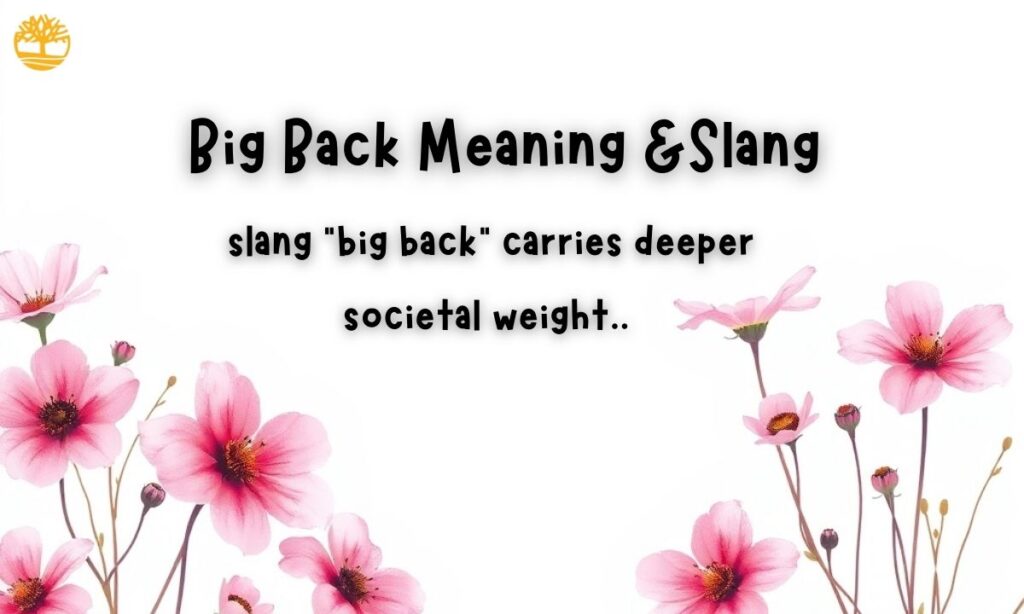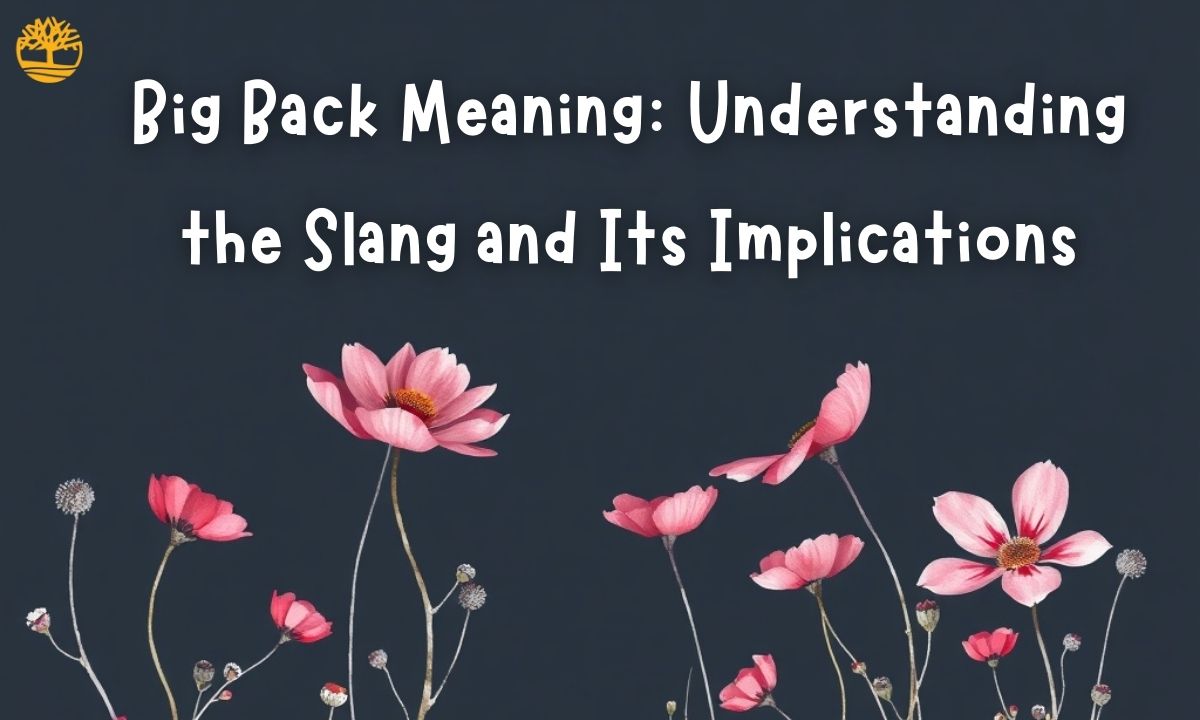Ever heard someone say “big back” and wondered what it really means? This slang isn’t just about size—it carries cultural weight, hidden context, and often a mix of humor and confidence. In today’s world of trending phrases, understanding slang is key to keeping up with conversations.
“Big back” has become more than just a casual comment—it’s a statement. Depending on who’s saying it, the meaning can shift between playful teasing, admiration, or even deeper social implications. Knowing the true context helps you avoid confusion and keeps you connected to modern language.
Origins of “Big Back”
Many people don’t know that “big back” isn’t just about size—it often reflects deeper cultural humor. In some circles, it was used to praise strength or presence, not only physical appearance. This hidden meaning is what gives the slang its playful edge.
Few realize that the phrase grew popular through music and street culture, where artists used it to describe confidence and boldness. It wasn’t always negative—it could carry a tone of respect or admiration depending on context. That makes its origin more layered than most think.
Another surprising fact is how regional slang shaped its spread. In certain areas, “big back” had slightly different meanings, from jokes among friends to social commentary. This shows how slang is fluid, adaptive, and shaped by community identity.
Interpretations and Usage
The term “big back” carries multiple meanings, and many people don’t know its deeper layers. It can be descriptive, playful, or even influenced by culture and social media. The tone, context, and delivery shape how this slang is understood.
1. Descriptive Usage
At its simplest, “big back” is used as a description of someone’s physical body shape. It points to noticeable size or form, often said in casual or teasing ways. While many assume it’s negative, some communities use it as admiration or recognition.
People often miss that descriptive slang like this can be neutral in intent. The meaning depends on whether the speaker uses it with humor, respect, or mockery. This flexibility makes it a phrase that changes with context.
In street culture, descriptive terms often become popular identifiers. “Big back” falls into this tradition, showing how people label physical traits in ways that mix observation with humor. It’s not always meant to offend.
2. Derogatory or Humorous Usage
In some circles, “big back” is used in a mocking way. Here, the phrase shifts from simple description to something more derogatory. People might use it to make jokes at someone’s expense.
However, many don’t realize that humor in slang can be both bonding and cutting. Friends may use the term jokingly to tease, while strangers might use it harshly. The emotional impact depends on relationship and tone.
Interestingly, derogatory slang often becomes reclaimed over time. What starts as mockery may later turn into a badge of humor or pride within the same group. “Big back” follows this same shifting pattern.
3. Cultural and Social Media Influence
What many don’t know is that social media amplified “big back” far beyond its roots. Online platforms, memes, and viral videos made it a trending phrase that people repeat worldwide.
Cultural influence plays a major role in shaping slang. When artists, comedians, or influencers use a term, it gains new meanings that may not match its original intent. This is how “big back” grew so quickly.
On social media, words are remixed, redefined, and spread at incredible speed. “Big back” became part of online humor, reactions, and even identity. Its cultural reach shows how slang evolves in the digital age.
Societal Implications

The slang “big back” carries deeper societal weight that many people don’t recognize. It connects to issues of body image, gender, and culture, showing how casual words can reflect broader attitudes. These hidden implications are often overlooked.
Body Shaming and Fatphobia
Few people realize that terms like “big back” can reinforce fatphobia. When used negatively, it highlights size as something shameful. This contributes to harmful stereotypes about body weight and appearance.
Body shaming through slang often hides behind humor. People may laugh, but the underlying message can be damaging. Language shapes self-image, and repeated jokes build harmful norms.
What many don’t know is that fatphobic slang can have long-lasting effects on confidence. For some, it becomes more than a joke—it’s a reminder of stigma that society normalizes.
Gendered Implications
The phrase is not neutral—women are often targeted more with “big back” comments. This reflects gendered expectations of beauty and body size. Men may hear it too, but the social weight differs.
Many overlook how slang reinforces double standards. While men may take it as teasing, women often feel reduced to physical traits. This reveals bias in how we discuss bodies.
Interestingly, in some spaces, women have reclaimed the phrase. They turn it into humor or self-confidence, flipping an insult into a playful identity. Still, the gender gap in perception remains clear.
Cultural Sensitivity and Appropriation
Another layer people rarely notice is cultural appropriation in slang. “Big back” began in specific communities but spread globally through music, memes, and online culture. Its original meaning often gets diluted or twisted.
When phrases are taken out of context, they can lose their cultural roots. Outsiders may use them without understanding the humor, history, or nuance behind the words. This can cause misunderstanding or offense.
The spread of slang like “big back” shows how culture and language interact in powerful ways. Respecting the origin of such terms is important to avoid misuse and to honor the communities that created them.
Alternatives and Encouraging Positive Language
Many people don’t know that using gentler words can reshape conversations. Instead of repeating slang that shames, we can highlight strength, beauty, or uniqueness. Choosing positive language changes how people feel about themselves.
Few realize that slang like “big back” can be replaced with uplifting expressions. Compliments that focus on confidence, personality, or health carry greater value. This shift helps build respectful communication in all spaces.
What often gets overlooked is how language creates culture. When people use affirming words, they set new norms for others to follow. Encouraging positive speech is more than kindness—it’s a step toward breaking harmful stereotypes.
Conclusion
The slang “big back” carries more weight than people realize. It began as casual street talk but grew into a phrase tied to culture, humor, and even stereotypes. Understanding its layers helps us see how words can shape perception.
By being mindful of language, we can move from judgment to respect. Choosing positive expressions encourages healthier conversations and builds confidence. In the end, slang should connect us, not divide us.

Muhammad Shoaib is a seasoned content creator with 10 years of experience specializing in Meaning and Caption blogs. He is the driving force behind ExactWordMeaning.com, where he shares insightful, clear, and engaging explanations of words, phrases, and captions.











